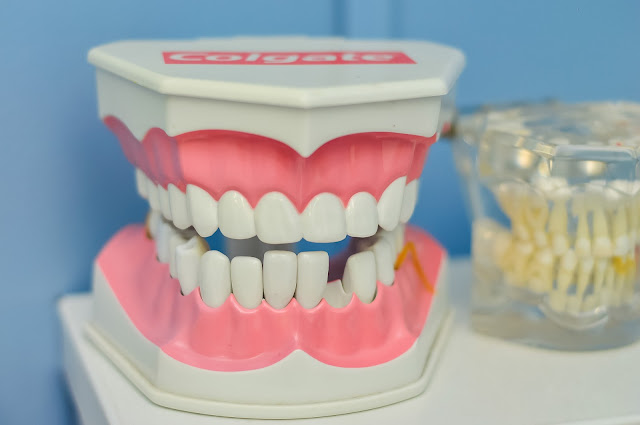A tooth abscess is pus formation inside the teeth, in the gums, or in the surrounding bone that keeps the teeth in place. Dental abscesses are usually painful but can be painless too. In either scenario, they should be examined by a dentist.
It's important to seek medical intervention at the earliest because abscesses don't heal on their own. The infection can sometimes spread to other parts of the body and get into the bloodstream causing grave illnesses.
 |
| Broken Teeth |
Types
- Periapical abscess: Caused by a chronic, localized infection usually at the tip, or apex, of the root of a tooth.
- Periodontal abscess: Originates in a periodontal pocket.
- Gingival abscess: isolated to gum tissue, without affecting either the periodontal ligament or the tooth.
- Pericoronal abscess: affecting the soft tissues surrounding the crown area of a tooth
- Combined periodontic-endodontic abscess: A condition in which a periapical abscess and a periodontal abscess have merged.
Risk factors
The following can increase the risk of developing a dental abscess:
- Inadequate oral hygiene – if you don't floss and brush your teeth regularly plaque can build-up on your teeth.
- Consuming sugary or starchy food and drink – these encourage the increase of bacteria in plaque and lead to decay that multiplies the chances of an abscess.
- Injury or previous surgical treatment of teeth or gums – bacteria can get into the damaged parts of the teeth or gum tissue.
- Weak immune system – this includes people health conditions, such as diabetes, and those undergoing treatment, like steroid medication or chemotherapy.
Prevention
Risk of developing dental abscesses (what is a dental abscess?) can be reduced by maintaining necessary oral hygiene. Therefore, to prevent it, you should:
- Floss at least once a day.
- Brush with a fluoride enriched toothpaste twice a day – for at least two minutes each time.
- Avoid excessive rinsing of mouth with water or mouthwash after brushing; this washes the protective toothpaste away.
- Avoid sugary and starchy food and drinks – particularly between meals or shortly before going to bed.
- Visit your dentist regularly – your dentist can suggest how often you should have a check-up, based on your oral health.
Symptoms
- An intense, throbbing ache in the affected tooth or gum that may occur suddenly and worsen gradually.
- Pain that radiates to your jaw, ear, and neck usually on the same side as the impacted tooth/ gum.
- Pain that worsens when you are lying down, possibly causing disturbed sleep
- Redness and swelling in your face.
- Tender, discolored and wobbly tooth.
- Shiny, sore and swollen gums.
- Teeth or gum sensitivity to hot, cold or sweet food and drink.
- Bad breath and a foul taste in the mouth.
- As the infection grows, you may find it tough to open your jaw fully and experience difficulty swallowing or breathing.
- You may develop a high fever and feel unwell overall.
What to do if you have a dental abscess?
You should consult your dentist if you believe you have a dental abscess. Visit your local emergency department – if there are no other options or you're experiencing difficulty breathing.
These measures can be used to relieve your symptoms temporarily:
- Painkillers can help control your pain.
- Ibuprofen is the preferred for dental abscesses, but if you're unable to take it due to contradictions, you can use paracetamol as an alternative. Children under 16 should be given Aspirin.
- It may also help if you avoid sweet, hot or cold food and drink.
- Try eating soft foods using the unaffected side of your mouth.
- Use a soft toothbrush and avoid flossing temporarily around the affected tooth.
Treatment
- Tooth abscesses are treated by removing the infection at its source and draining the pus.
- Based on the area of the abscess and the severity of the infection other treatment options include:
- Extracting the affected tooth: This may be necessary in severe cases.
- Root canal treatment: Removing the abscess from the root of the impacted tooth before it is filled and sealed.
- Surgical drainage: Where a small cut is made in the gum to drain the pus.
- Antibiotic treatment: Antibiotics aren't prescribed for dental abscesses, but if the infection spreads or is advancing aggressively, the dentist may recommend antibiotic treatment.
Related Article: Pediatric Dentistry Guide for ParentsAurora Dentist, Dr. Bob Dokhanchi says “Tooth abscess is painful and requires urgent medical intervention. While you wait for your dentist consultation, a combined dose of paracetamol and ibuprofen can provide relief from pain.But is not recommended for children under sixteen.”
Do not put up with the pain; the condition only worsens when left untreated. Consult your dentist right away.
References:
- https://en.wikipedia.org/wiki/Dental_abscess
- http://foxvalleydental.com/dental-cleaning-consultation/
- http://foxvalleydental.com/
- https://ada.com/conditions/dental-abscess/

Comments
Post a Comment